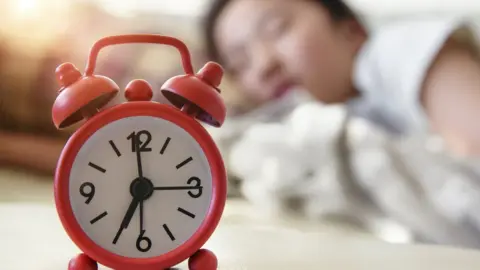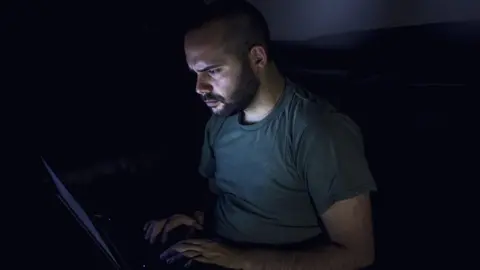Late risers at increased risk of early death, study finds
 Getty Images
Getty ImagesPeople who go to bed late and struggle to wake in the morning are more likely to die prematurely than early risers, according to new research.
Night owls are 10% more likely to have early deaths than morning larks, a study of some 433,000 people found.
The research also found late risers were more likely to have a range of mental and physical illnesses.
The paper's authors said more should be done to help night owls function in a "morning lark world".
'Public health issue'
Scientists asked study participants, who were aged 38 to 73, whether they considered themselves to be a "definite morning type", a "moderate morning type", a "moderate evening type", or a "definite evening type".
The study, published in the journal Chronobiology International, then looked at deaths among these people for up to six and half years later.
After adjusting for factors like age, sex, ethnicity, smoking, body mass index and socioeconomic status, researchers found the chance of an early death was lowest in the definite morning types, with the risk going up among each body clock type as they got later.
Comparing the definite evening types with definite morning types, night owls were also 90% more likely to have psychological disorders and 30% more likely to have diabetes, as well as being more prone to gastrointestinal and neurological disorders.
While the paper's authors did not look at how the health issues were being caused, they said it was likely that people with late body clocks were being harmed by having to adjust their habits to a "morning lark world".
 Getty Images
Getty ImagesKristen Knutson, associate professor of neurology at Northwestern University Feinberg School of Medicine, said: "It could be psychological stress, eating at the wrong time for your body, not exercising enough, not sleeping enough, being awake at night by yourself, maybe drug or alcohol use.
"There are a whole variety of unhealthy behaviours related to being up late in the dark by yourself."
Malcolm von Schantz, professor of chronobiology at the University of Surrey, and another author of the paper, said the problems experienced by night owls were a "public health issue that can no longer be ignored".
"We should discuss allowing evening types to start and finish work later, where practical," he said.
"And we need more research about how we can help evening types cope with the higher effort of keeping their body clock in synchrony with sun time."
'You're not doomed'
But while the study makes less than positive reading for late risers, Prof Knutson said night owls are not "doomed".
Scientists say that about 40% to 70% of a person's circadian rhythm, or body clock, is genetic, with the rest influenced by environment and age.
"Part of it you don't have any control over and part of it you might," Prof Knutson said.
Among the tips she and other sleep experts recommend to shift your body clock earlier are:
- Make sure you are exposed to light early in the morning but not at night
- Try to keep a regular bedtime and not let yourself drift to later bedtimes
- Be regimented about adopting healthy lifestyle behaviours and recognise that the timing of when you sleep matters
- Do things earlier and be less of an evening person as much as you can.
